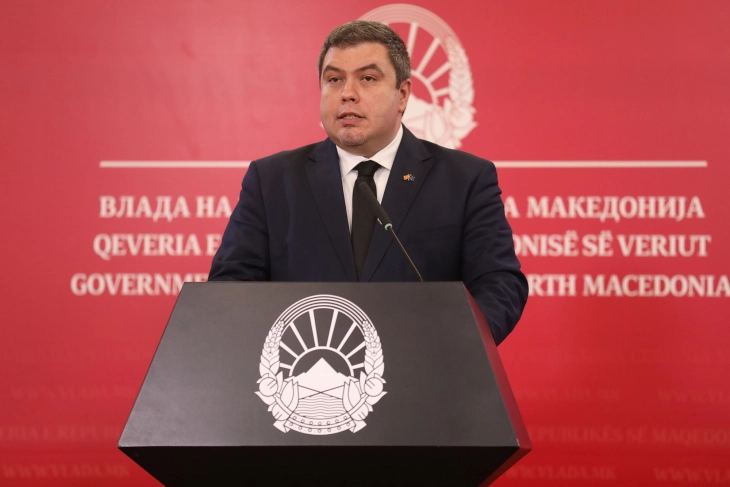Marichikj: EU accession process began two days ago, de jure and de facto
- Post By Ivan Kolekevski
- 11:21, 21 July, 2022

Skopje, 21 July 2022 (MIA) – We began negotiations the way we promised – with a protected Macedonian language and identity. Everything that is being done is so that we, our citizens and our children have a better life and live like all other European people, said Deputy Prime Minister for European Affairs Bojan Marichikj on Thursday.
“The process began two days ago, on July 19, de jure and de facto, when the first Intergovernmental Conference was held which marks the last stage of our EU membership path,” Deputy PM Marichikj told a press conference.
He underlined this has been the country’s strategic goal ever since its independence, and it is finally becoming a reality, 21 years after the signing of the Stabilisation and Association Agreement and 17 years after the country became an EU candidate member.
Marichikj said 45 percent of the country’s legislation is already aligned with the European law and added that the capacities for translation into Macedonian are constantly being increased.
“The screening process consists of two phases. Explanatory screening in which the European Commission presents the key legal acts for each chapter to the candidate country; and bilateral screening in which the candidate country presents the level of alignment of the national legislation in accordance with the EU acts presented in the previous phase, but also the institutional capacities and the enforcement of laws,” said Marichikj.
He clarified that even though the screening is seen as a technical operation, it should be seen as an essential element of the accession talks, because it paints a clear picture of what needs to be done in the coming years in order to carry out the EU reform agenda and to open, make progress and close the chapters and clusters. According to Marichikj, the screening by clusters and chapters will officially begin in September and will be carried out simultaneously for North Macedonia and Albania.
He presented the six clusters of the negotiating chapters/topics and explained the country’s obligations and their implementation.
Cluster 1. Fundamentals
23 - Judiciary and fundamental rights
24 - Justice, Freedom and Security
Economic criteria
Functioning of democratic institutions
Public administration reform
5 - Public procurement
18 – Statistics
32 - Financial control
Cluster 2. Internal Market
1 - Free movement of goods
2 - Freedom of movement for workers
3 - Right of establishment and freedom to provide services
4 - Free movement of capital
6 - Company law
7 - Intellectual property law
8 - Competition policy
9 - Financial services
28 - Consumer and health protection
Cluster 3. Competitiveness and inclusive growth
10 - Information society and media
16 – Taxation
17 - Economic and monetary policy
19 - Social policy and employment
20 - Enterprise and industrial policy
25 - Science and research
26 - Education and culture
29 - Customs union
Cluster 4. Green agenda and sustainable connectivity
14 - Transport policy
15 – Energy
21 - Trans-European networks
27 - Environment and climate change
Cluster 5. Resources, agriculture and cohesion
11 - Agriculture and rural development
12 - Food safety, veterinary and phytosanitary policy
13 – Fisheries
22 - Regional policy & coordination of structural instruments
33 - Financial & budgetary provisions
Cluster 6. External relations
30 - External relations
31 - Foreign, security & defence policy
ad/ik/







